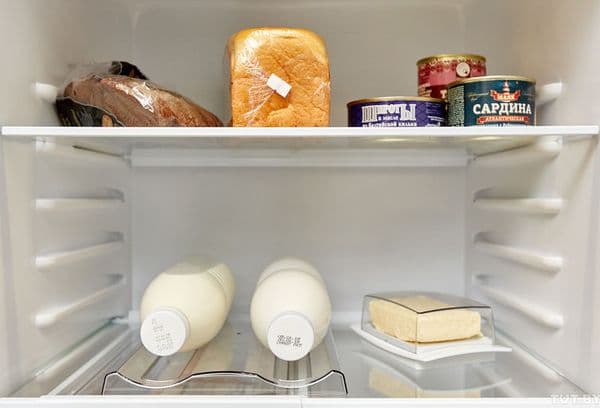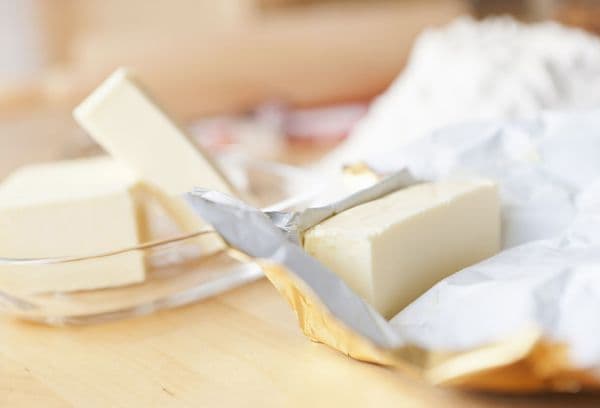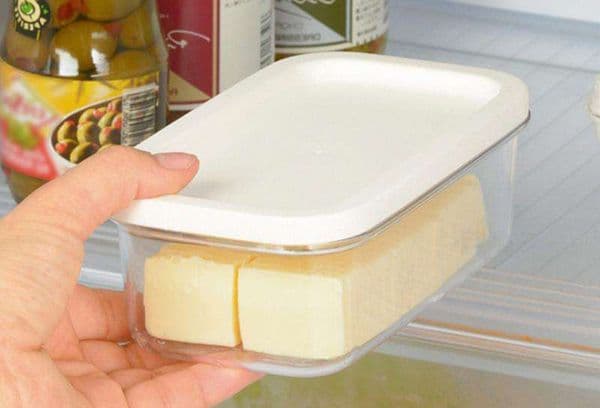Can butter go bad in the refrigerator and freezer?
Butter is a tasty, high-calorie and extremely healthy product in moderation. It is prepared from heavily whipped cream in the cold. Does this mean that the oil can no longer go bad? No - the product must be kept in the refrigerator. How long does butter last? Depending on the composition and temperature in the chamber - from 5 to 120 days.

Standard terms
If you look at GOST standards, you will find the average shelf life of butter. They depend on the following factors:
- product composition,
- its fat content,
- air temperature,
- packaging material.
Thus, simple parchment protects the product worse than in foil - the block loses moisture more, absorbs foreign odors more actively, oxidation and polymerization processes occur faster in it, and when stored in the cold, and not in the freezer, the development of bacteria accelerates. As a result, stuff appears - a dark and tasteless coating on the bracket.
Table. Standard terms for a store pack, days.
| Temperature, °C | Fat content, % | ||
| 70—85 | 60—69 | 50—59 | |
| +5 to +1 | 35 | 30 | 25 |
| -3 to -9 | 60 | 50 | 50 |
| From –14 to –18 | 120 | 75 | — |
The numbers given in the table are for packaging in foil on a paper backing. In parchment, butter can be kept in the refrigerator for no longer than 20 days, in the freezer - up to 25-30 days.
Advice
In sealed plastic containers, artificial paper and other packaging that does not allow air to pass through, the oil is at risk of mold (unless it is in the freezer). Pry up the edge so that the oil is not tightly clogged, but also does not ventilate.
The smaller the piece of butter, the faster it will spoil. Therefore, after opening a pack, it is better to quickly eat it and use it for cooking.
Why is there an inflated number on the pack?
Today, shelf life on packs often exceeds standard ones. This is due either to the dishonesty of the manufacturer (the expiration date is indicated for oil packaged in barrels or boxes, for example), or to the specifics of production.
What extends shelf life:
- Pasteurization. Raw cream will easily introduce bacteria into the butter, so the homemade product will taste worse. After pasteurization, the oil can remain in the refrigerator for 45 days (unopened).
- Leaven. In addition to the traditional one, butter made from cream with leaven is also produced - sour cream. It lasts longer than the traditional one, but its taste is slightly different.
- Vacuum. The oil is fed into the distribution tap by an auger, like meat in a meat grinder. Because of this, moisture is squeezed out of the product, the finished bracket turns out to be overdried on the inside and damp on the outside - this shortens the shelf life. But if the oil was packaged under vacuum conditions, moisture remains in the product.
- Homogenization — if the equipment does not allow creating a vacuum, the oil is finely chopped before being sent to the packaging machine. This way, noticeably less moisture is squeezed out, the product is more homogeneous and lasts longer.
- Conservation. Various special additives can extend the shelf life, but the final product is not the healthiest or safest.
On the contrary, sweet additives, salt and other flavoring agents shorten the shelf life of the oil.
Advice
When buying a pack, evaluate the composition. Reconstituted or normalized cream is a sign of low quality. But pasteurized ones speak in favor of the product.There should be no additional inclusions (except for salt, sugar, cocoa, etc. - for taste).
How to store it correctly
Oil is best stored in laminated (paper-based) foil, tightly packed. But for sandwiches it is inconvenient to hold butter like this - the magazine purity-en.htgetrid.com recommends purchasing a glass, earthenware or food-grade plastic butter dish with a lid.
The cutlery will protect the product from excess air, but will not allow it to “shut up.” However, as soon as the oil runs out, the oil can must be thoroughly washed and dried to get rid of oxidation products and bacterial growth. Otherwise, the new bracket will begin to deteriorate faster.
If you plan to use the oil rarely, then it is better to put it in the freezer. The fact that the oil freezes does not deteriorate the taste. The main thing is to defrost it gradually, in the refrigerator (if you plan to make sandwiches or baked goods), but you can throw it into porridge right away - it will melt a little slower than soft.
The oil is rich in fats, which provide energy for the whole day, vitamins A, B and other valuable elements. Store it correctly, and the product will not go rancid for a long time and will delight your household with its taste and benefits.



